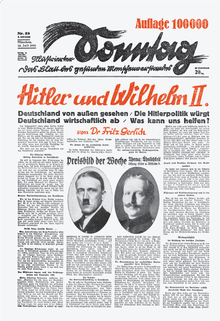Illustrated Sunday
The newspaper Illustrierter Sonntag was published in Munich between 1929 and 1931. In the last year in particular, the leading articles were directed against the emergence of National Socialism .
Publishers and owners
Since March 31, 1929, the weekly magazine Illustrierter Sonntag was published by Pesta Verlag GmbH in Munich . Since its owner, lawyer Anton Graf von Pestalozza, got into financial difficulties, he pledged it to his printer, the Munich book trade house M. Müller & Sohn , Schellingstrasse 39/45. On September 16, 1930, it acquired Natur-Verlag GmbH from this company, the name of which first appeared in the October 5, 1930 edition. Fritz Gerlich became the publisher and editor-in-chief .
In the meantime he was looking for a way of contributing to the political "recovery" of the German people by spreading natural law as the basis of human rights. In this he was supported, especially financially, by the Upper Swabian entrepreneur and landowner Erich Fürst von Waldburg-Zeil . Already in the summer of 1930, together with Abbot Adalbert von Neipperg and a later colleague of Gerlich, Hans-Georg von Mallinckrodt, he had built the Catholic community of acts , to which Gerlich was invited. Together, Waldburg-Zeil and Gerlich wanted to achieve the “missionary task for public education” assigned to them by the stigmatized farmer's maid Therese Neumann (“Resl von Konnersreuth”) by publishing a newspaper.
So Gerlich and Waldburg-Zeil founded a publishing house with the code name Natur-Verlag - instead of Naturrechts-Verlag - and acquired the deficit Sunday illustrated with a circulation of 30,000–35,000 copies. Waldburg-Zeil financed the purchase price and continued to finance the publishing house. Gerlich received half of the company's shares for his “intellectual contribution”. He gave the illustrated Sunday the subtitle The sheet of common sense and secured his editorial freedom with the book trade house M. Müller & Sohn, which also printed the Völkischer Beobachter . Josef Hell remained responsible for the content of the 16-page weekly; Johannes Steiner became the managing director of Natur-Verlag .
Fight against National Socialism
For ten months, since February 1931 in articles by name, Gerlich sought to get the readers of the Illustrierte Sonntags in the mood for his fight against the false doctrines of the totalitarian movements through general educational and anti-Marxist articles. He began it on July 12, 1931 against National Socialism in an article "Hitler and Wilhelm II.", Whose headline was also highlighted in red for the first time, as with the Völkischer Beobachter . Since August 23, 1931, Gerlich also appeared as an editor. In numerous articles, supported by the Capuchin Father Ingbert Naab (with amounts such as “I am a Hitler, why actually?”) And the biblical scholar Franz X. Wutz , both of Eichstätt, as well as with constant encouragement from Therese Neumann, he exposed National Socialism as a political doctrine of salvation and surrogate religion.
Gerlich condemned their racial ideology, warned of their dangerousness, attacked Adolf Hitler and his group of leaders and prophesied the horrors of the "Third Reich" they propagated . In articles like “Open Letter to Dr. Brüning ”also criticized the policy of emergency regulations of the then Reich Chancellor as a veiled legal dictatorship with a habitual effect. This was supported from October 1931 by newspaper caricatures based on the American model. From January 1932 he clarified the programmatic orientation of the publisher and the newspaper also in their names. Natur-Verlag was renamed Naturrechts-Verlag and Illustrierte Sonntag was renamed The Straight Path .
swell
- Illustrated Sunday. The sheet of common sense (No. 1 from March 31, 1929 to No. 52 from December 27, 1931): digitized version of the magazine “Illustrierter Sonntag” / “Der direkt Weg” in the online offer of the Bayerische Landesbibliothek
- Prophecies against the Third Reich. From the writings of Dr. Fritz Gerlich and Father Ingbert Naab OFM Cap . Collected by Dr. Johannes Steiner, Verlag Dr. Schnell & Dr Steiner, Munich 1946
literature
- Erwein Freiherr von Aretin: Fritz Michael Gerlich. Prophet and martyr. His source of strength (second edition with a commentary on contemporary history by Karl Otmar Freiherr von Aretin), Verlag Dr. Schnell & Dr. Steiner, Munich, Zurich 1983. ISBN 3-7954-0099-6
- Rudolf Morsey (arr.): Fritz Gerlich - a publicist against Hitler. Files and letters 1930–1934 . Ferdinand Schöningh, Paderborn a. a. 2010. ISBN 978-3-506-77012-7
- Michael Schäfer: Fritz Gerlich 1883–1934. Journalism as an examination of the “political religions” of the 20th century . Dissertation Munich 1998
Individual evidence
- ↑ Stephan Malinowski, From the king to the leader. German nobility and National Socialism. Akademie-Verlag, Berlin 2003, pp. 381–385
- ^ Rudolf Morsey (arr.): Fritz Gerlich - a publicist against Hitler. Files and letters 1930–1934. Ferdinand Schöningh, Paderborn et al. 2010, pp. 24, 321–323
- ^ Rudolf Morsey (arr.): Fritz Gerlich - a publicist against Hitler. Files and letters 1930–1934. Ferdinand Schöningh, Paderborn et al. 2010, pp. 24-29, 323-327
